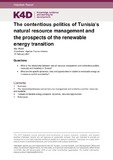The Contentious Politics of Tunisia’s Natural Resource Management and the Prospects of the Renewable Energy Transition
Abstract
For many decades in Tunisia, there has been a robust link between natural resource management and contentious national and local politics. These disputes manifest in the form of protests, sit-ins, the disruption of production and distribution and legal suits on the one hand, and corporate and government response using coercive and concessionary measures on the other. Residents of resource-rich areas and their allies protest the inequitable distribution of their local natural wealth and the degradation of their health, land, water, soil and air. They contest a dynamic that tends to bring greater benefit to Tunisia’s coastal metropolitan areas. Natural resource exploitation is also a source of livelihoods and the contentious politics around them have, at times, led to somewhat more equitable relationships. The most important actors in these contentious politics include citizens, activists, local NGOs, local and national government, international commercial interests, international NGOs and multilateral organisations. These politics fit into wider and very longstanding patterns of wealth distribution in Tunisia and were part of the popular alienation that drove the uprising of 2011. In many ways, the dynamic of the contentious politics is fundamentally unchanged since prior to the uprising and protests have taken place within the same month of writing of this paper. Looking onto this scene, commentators use the frame of margins versus centre (‘marginalization’), and also apply the lens of labour versus capital. If this latter lens is applied, not only is there continuity from prior to 2011, there is continuity with the colonial era when natural resource extraction was first industrialised and internationalised. In these ways, the management of Tunisia’s natural wealth is a significant part of the country’s serious political and economic challenges, making it a major factor in the street politics unfolding at the time of writing.
Citation
Walsh, A. (2021). The contentious politics of Tunisia’s natural resource management and the prospects of the Renewable Energy transition. K4D Helpdesk Report. Brighton, UK: Institute of Development Studies. DOI: 10.19088/K4D.2021.048DOI
10.19088/K4D.2021.048Is part of series
K4D Helpdesk Report;961Rights holder
© Crown copyright 2021Sponsor
FCDO (Foreign, Commonwealth and Development Office)Collections
- K4D [937]

